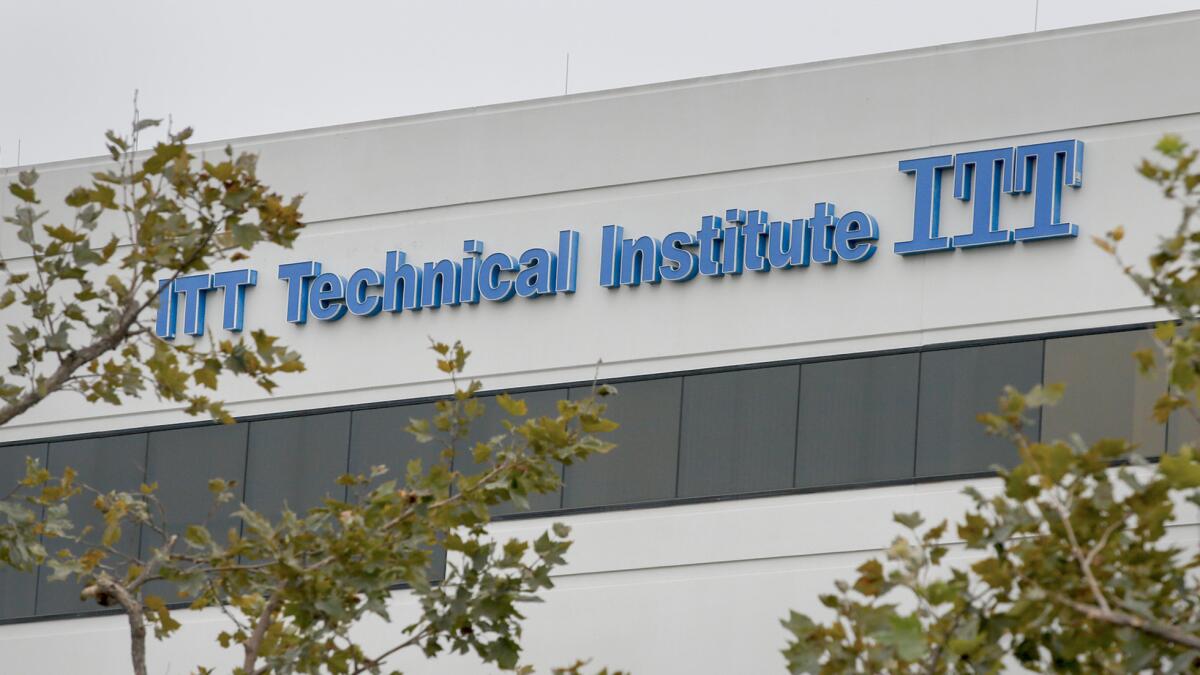SEC settles fraud charges against defunct for-profit college company ITT

- Share via
The Securities and Exchange Commission has settled its fraud case against ITT Educational Services, but it continues to pursue top executives from the defunct for-profit college firm for deceiving investors about high rates of late payments and defaults on student loans backed by the firm.
A final judgment order filed Friday resolves civil fraud charges brought against the company two years ago for false and misleading statements about the failure of two in-house student-loan programs. There is no monetary penalty, and the company did not admit any wrongdoing.
ITT Chief Executive Kevin Modany and former chief financial officer Daniel Fitzpatrick are still fighting the allegations made against them by the SEC, which declined to comment on those proceedings.
Regulators at the SEC have accused ITT’s top brass of making secret payments on delinquent accounts to delay defaults instead of disclosing the tens of millions of dollars in impending losses to investors. According to the complaint, executives assured investors in conference calls that the programs were performing well, while ITT’s obligations to pay out on soured loans began to balloon.
Company officials have denied the allegations from the outset.
The company ended operations at all of its ITT Technical Institutes in September after the U.S. Department of Education curtailed its access to federal loans and grants when an accrediting body threatened to pull the school’s accreditation amid mounting lawsuits and investigations. Days after shutting down 137 campuses and leaving 35,000 students and 8,000 employees in the lurch, the company filed for bankruptcy protection to liquidate its business.
The bankruptcy is dragging on as creditors, federal regulators, state attorneys general, jilted employees and students lay claim to the remaining assets. For its part, the Education Department is seeking about $232 million to recover federal student aid funds extended to ITT and the student loans it has forgiven as a result of the closure. In court filings, the department estimates that those closed-school discharges will cost more than $460 million to complete.
Though students are seeking redress through the liquidation, a $639-million claim filed by the Consumer Financial Protection Bureau could deliver them restitution. The CFPB claim arises out of a lawsuit alleging that ITT provided zero-interest loans to students but failed to tell them that they would be kicked out of school if they didn’t repay in a year. When students could not pay, the CFPB says, ITT forced them to take out high-interest loans to repay the first ones.
The loan programs in that case are at the heart of the SEC lawsuit. ITT created the two in-house student-loan programs as private lenders retreated from the market at the height of the 2008 financial crisis. To get investors to finance the in-house loans, the company offered a guarantee to limit the risk of students not repaying the debt. If a certain percentage of loans soured, the company agreed to cover the principal, interest and fees, according to the SEC complaint.
The SEC said investors did not have direct information about the performance of the debt because ITT kept the loan programs off its balance sheet. All investors could rely on was the company’s word when students began defaulting en masse around 2011.
Regulators said executives failed to tell investors that the company was facing $30 million in guarantee obligation payments at the end of 2012, and used accounting tricks to hide the financial time bomb. It wasn’t until 2014 that ITT reported over $60 million in charges related to its loan programs, which sent shares tumbling.
When the SEC filed its lawsuit, ITT said it consulted with experts, including an independent auditor, to confirm that its accounting was appropriate. Company officials also said they informed state regulatory authorities, accrediting agencies and the Education Department.
Those assurances mean little to lawmakers and consumer advocates who want the company and its executives held accountable for what they say is blatant fraud.
In a letter sent Friday, Democratic Sens. Richard J. Durbin of Illinois and Sherrod Brown of Ohio urged SEC Chairman Jay Clayton to bar Modany from serving as an officer of any public company and to impose stiff penalties on him and Fitzpatrick. The lawmakers expressed outrage that Modany, who did not immediately respond to requests for comment, is seeking more than $3.3 million in deferred compensation and severance pay, after receiving more than $36 million in total compensation from 2007 to 2014 at ITT.
“Justice demands that any outcome in this matter include the highest applicable civil money penalties and disgorgement of the ill-gotten gains with which Mr. Modany and Mr. Fitzpatrick have thus far absconded,” the senators wrote. “Preventing future misconduct in the for-profit college industry requires that the SEC hold executives in the ITT case accountable.”
More to Read
Inside the business of entertainment
The Wide Shot brings you news, analysis and insights on everything from streaming wars to production — and what it all means for the future.
You may occasionally receive promotional content from the Los Angeles Times.









